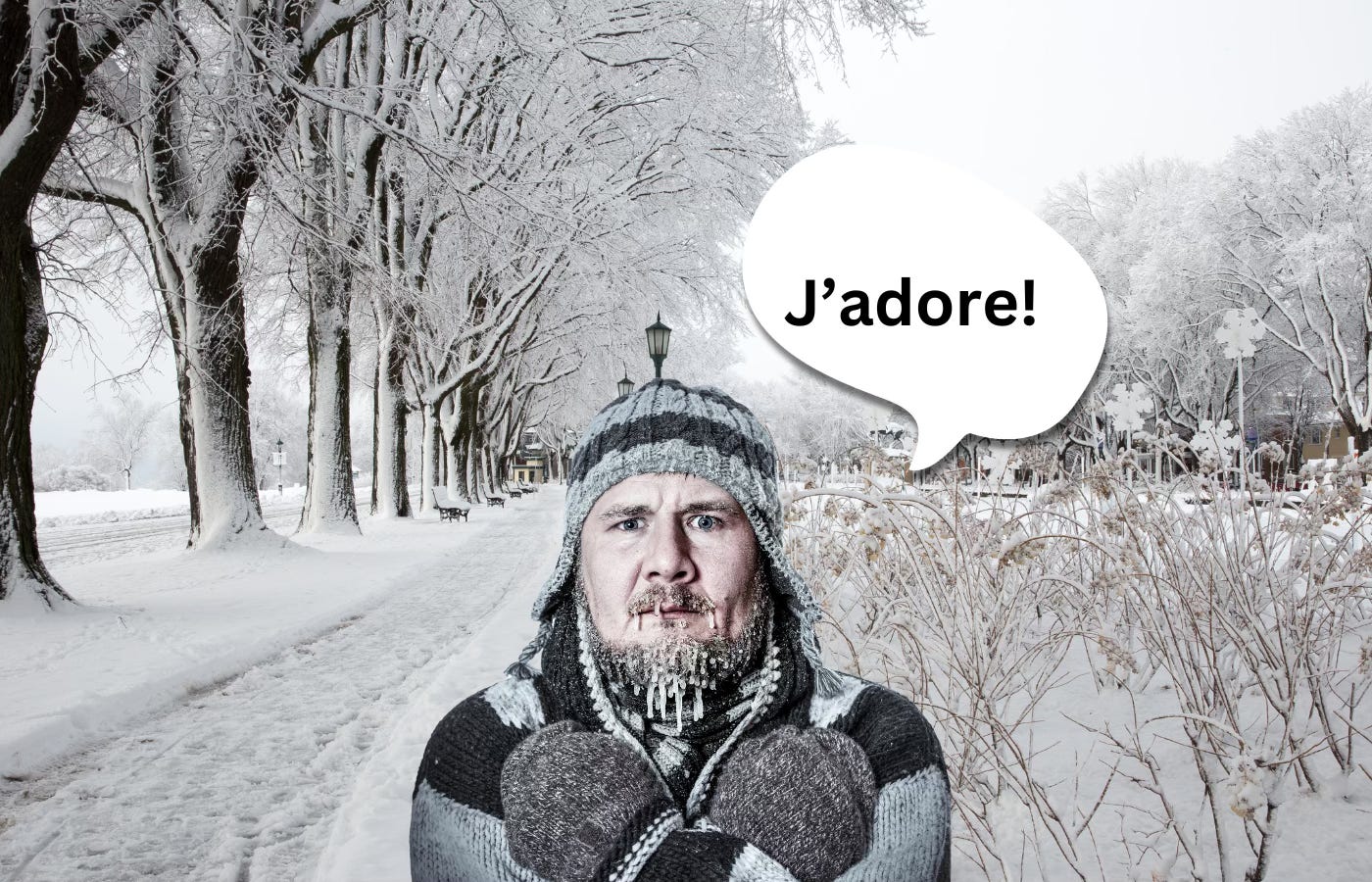Today, I am presenting one of my final articles in English that explains rarely discussed grammar points in French. After this, I will be transitioning to a different format.
There are now over 50 articles in this section, accessible to my members. This is a wealth of information to take your French to the next level!
J’adore
In general in French, we always require a complement or object.
For example, you cannot just say
Je vais aller
Je veux
These sentences are incomplete because the verbs aller (to go) and vouloir (to want) typically need an additional element, such as a place or an action, to form a complete sentence.
You would need to say, for example
Je vais aller à la plage
Je vais y aller
Je veux un café
J’en veux un
However, this is not really a rule set in stone.
For verbs expressing opinion or appreciation, it’s possible to simply say
Je sais
J’aime
J’adore
So in answer to the questions
Est-ce que tu aimes la pizza?
Est-ce que tu aimes Montréal?
You could simply answer
J’adore!
J’aime!
Tout cela peut sembler un peu compliqué, mais c’est avec beaucoup d’écoute active et de pratique que ça va sembler naturel!
Donner
Donner is a very simple verb on the surface. The first meaning is “to give.”
But donner can also have other meanings.
1 – Donner as “worth doing something”
Je vais voir ce que ça va donner
I will see how this will turn out
Ça ne donne rien de faire ça
It’s not worth doing this
Ça ne donne rien de l’aider, il n’apprécie pas ce qu’on fait pour lui
It’s not worth helping him, he doesn’t appreciate what we do for him
2- Donner to mean “yield results”
Ça pourrait donner de bons résultats
It could lead to good results
Le potager donne beaucoup de tomates cette année
The garden is producing a lot of tomatoes this year
3- Donner to mean “overlook”
Mon appartement donne sur la ruelle
My apartment overlooks the alley
Make sure that
One thing is for sure. You can’t translate the expression “make sure that” with faire sûr que. (Although I’ve heard that in Gatineau.)
We can say “making sure” in different ways
I’ll make sure to book in advance
Je vais m’assurer de réserver à l’avance
Je vais m’occuper de réserver à l’avance
Please make sure that everything goes well
S’il te plait, arrange-toi pour que tout se passe bien
S’il te plait, fais en sorte que tout se passe bien
Make sure that you call me!
N’oublie pas de m’appeler
Make sure to lock the door behind you
N’oublie pas de verrouiller la porte derrière toi
Assure-toi de verrouiller la porte avant de partir
D’une part, d’autre part
Let’s consider the following example.
What’s better, flying or driving? One the one hand, you have traffic and fuel costs to deal with. On the other hand, you have long lines at the airport, and the real possibility of flight cancellations.
To express this kind of opposition, you can use different expressions in French
Qu'est-ce qui est le plus avantageux, l'avion ou la voiture ?
D’une part, il y a le trafic et le prix du carburant.
D'autre part, il y a les longues files d'attente à l'aéroport et la possibilité réelle d'annulation des vols.
Less formally, we could say
Qu'est-ce qui est le mieux, l'avion ou la voiture ?
D’un côté, il y a le trafic et le prix du carburant.
De l’autre, il y a les longues files d'attente à l'aéroport et la possibilité réelle d'annulation des vols.
Exercise
Translate the following examples into French.
Do you love Montreal? I love it!
How many will you take? I’ll take two.
It’s not worth doing this (use verb donner).
The terrace overlooks the sea.
Make sure the door is securely closed.
Make sure that you call first.
On the one hand, working from home offers flexibility.
On the other hand, it can be isolating.
It’s not worth arguing with him, he doesn’t listen.
The tree is producing a lot of fruit this season.
Answers
Tu aimes Montréal?J'adore!
Vous allez en prendre combien? Je vais en prendre deux.
Ça ne donne rien de faire ça.
La terrasse donne sur la mer.
Assurez-vous que la porte est bien fermée.
N'oubliez pas d'appeler d'abord.
D'une part, le travail à domicile offre une certaine flexibilité.
D'autre part, il peut être source d'isolement.
Cela ne donne rien discuter avec lui, il n'écoute pas.
L'arbre donne beaucoup de fruits cette saison.



